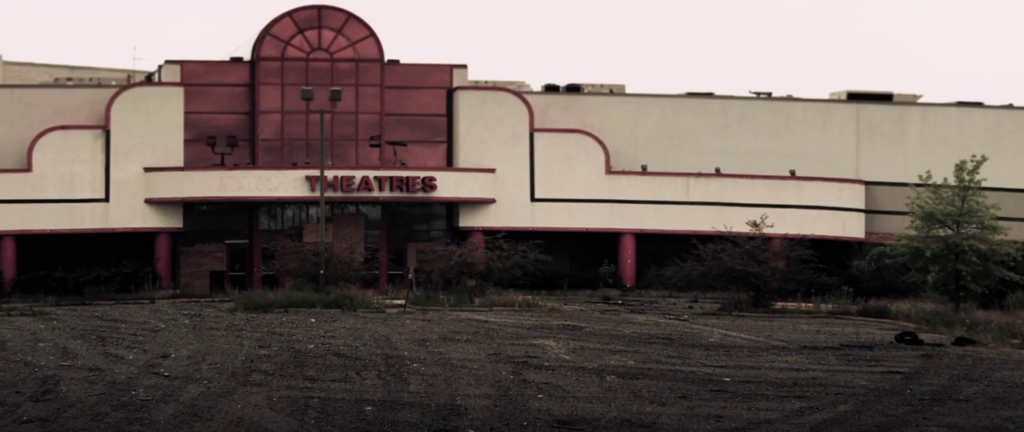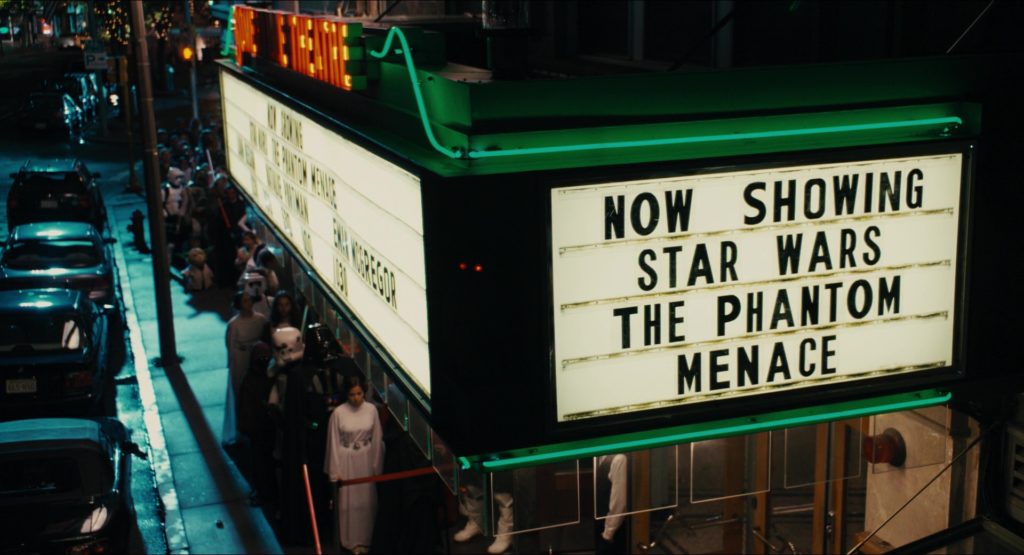
I don’t know personally that I’ll ever work in movie theaters again—perhaps that part of my life is over.
On Monday, July 13, the city of Boston entered Step 1 of Phase 3 of its recovery plan, which among various other updates allowed for the reopening of indoor movie theaters. But four weeks later, when a version of this report was first published in the inaugural member’s issue of DigBoston, only two or three movie theaters in the state had actually reopened. That was mostly owing to the understandably restrictive conditions set by the administration of Gov. Baker—no more than 25 people per auditorium, and no concession sales beyond prepackaged items—but also due to the fact that any reopened theaters would have no high-profile new releases to play. That changes with the imminent release of Tenet (2020), and in turn the state of moviegoing in Massachusetts changes with it. A month ago the only place you could see a feature-length film around here was the West Newton Cinema, and now, hell, you can see one in a casino.
That would be the Regal Cinemas at the MGM Springfield, which reopened last weekend in the ramp-up to Tenet’s release. By that point, a huge percentage of the area’s movie theaters had resumed business—including most operated by chains AMC, Landmark, Showcase Cinemas, and Regal—with some notable exceptions spread across the city and state:
• Both the Brattle Theatre and the Coolidge Corner Theatre, citing public safety concerns as well as their inability to properly do business under the present restrictions, remain closed to the public (however both do offer private screenings to small groups—information on Brattle rentals can be found here, and information on Coolidge rentals can be found here.)
• Given that the city of Somerville has not yet entered Stage 1 of Phase 3, no theaters have been permitted to open there. That includes the AMC Assembly Row 12 as well as the Somerville Theater—which is managed by the same company that owns the Capitol Theatre in Arlington, which in turn also remains closed.
• CinemaSalem, a four-screen theater in the Witch City Mall, has permanently closed per various reports. Speaking to Wicked Local in early June, owner Paul Van Ness said: “We have been working hard over the past six months to recruit new operators for the theater, and we succeeded in finding two well-qualified parties with creative business plans and community-oriented visions. … But once the pandemic hit, neither believed they could find a way to make the numbers add up to a sustainable business.”
The case of CinemaSalem illustrates why “community-oriented” theaters including the West Newton Cinema had to reopen as soon as possible: Like so many other businesses, large and small, local and national, they did so in large part because the debilitating financial aftereffects of the required closure, in concert with the genuinely astounding lack of governmental support on either the state or federal level, have left them with few alternatives.
“The first weekend was certainly light in numbers—I think the most we had was 12 people on one day across six or seven different shows,” said Bridget Bali, a representative of the West Newton Cinema, during an interview about their reopening conducted by phone in late July. “It started to pick up a bit last week. I don’t know [the numbers] exactly, but we were starting to see more in the range of five or six people per show… I mean, we had the GoFundMe, and it was incredibly helpful, but every last penny of that went to just covering the bills of those four months.”

Attendance doesn’t seem to have trended up much at the West Newton, given that owner David Bramante recently told Boston.com that “If I could get 25 people in a theater, that would be great right now.” And sadly, reports indicate that corporate theaters aren’t having the same problems: For instance a Boston Globe article regarding the August 20 reopening of 10 local AMC theaters noted that “On [that date], all 19 auditoriums [at the AMC Boston Common] were filled to 30 percent capacity — the maximum allowed under state guidelines — from 2 p.m. to 8 p.m.”
For some of the independent, nonprofit, and privately-owned movie houses in our state—most of which have less screens than the West Newton Cinema, not to even mention corporate multiplexes like the AMC Boston Common—it’s that “maximum” holding them up probably moreso than anything else. Those regulations mean that places like the Brattle, Coolidge, and Somerville theaters would be operating way below the 25% capacity their executives and managers were roughly expecting in the months leading up to Phase 3.
“We were thinking it might be similar to church guidelines at 40%, but were prepared for 25%,” wrote Ian Judge, director of operations for the Capitol and Somerville theaters, via email. “[And] we were blindsided by the food restrictions completely.”
Judge, who has since been furloughed along with the rest of the Capitol and Somerville’s staff, was referring to the fact that indoor movie theaters are not currently allowed to sell most concessions in Massachusetts—which pre-Tenet was probably the most essential detail of them all. Ned Hinkle, creative director at the Brattle, put it quite bluntly while speaking with the Boston Globe in July: “It is not worth reopening if we can’t sell food.”
In a later conversation with Boston.com, the Brattle’s executive director Ivy Moylan clarified that “pre-packaged concessions … are not considered food service” and therefore can be sold at theaters. Regardless, most of the movie theaters reopening locally around that time did so with their concession stands closed. That too changed with the rush toward Tenet; Showcase Cinemas, for instance, was offering “concessions in covered containers” when it reopened on August 28 per a report from WCVB5.
And a New York Times report from August 21 detailing the introduction of “CinemaSafe”—a set of “uniform health protocols” agreed upon by major chains AMC, Cinemark, Marcus, and Regal, with the emphasis characteristically placed on branding (“Participating locations will display logos with a green check mark on a theater seat and the slogan Your safety is our focus”)—suggested that all those chains would be selling concessions wherever permissible (then while defending that point, Regal executive Mooky Greidinger offered the Times what has to be one of the most ludicrously fucking stupid examples of doublespeak pseudoscience that I’ve encountered in the last six months: The report eventually stated that “[Greidinger] noted everyone’s mouth will be pointed in the same direction while chewing. And chewing (with one’s mouth closed) without a mask is considered safer than speaking without one.”)

Yet even for places like the Brattle and Coolidge this is all probably happening sooner than later, because while Boston’s independent and nonprofit theaters may not reopen alongside the multiplexes during Step 1 of Phase 3, they almost certainly won’t be able to wait until Phase 4—the day where there’s a readily accessible vaccine or treatment—for the exact same reasons the big chains are back open now: Shutdowns of a year or more would likely mean permanent closure for at least some of the movie theaters mentioned in this article, especially if we presume the continued absence of major governmental actions far beyond what’s already been provided. And if you think I’m being melodramatic on that point, just do a Google news search for Boston, restaurants, closed.
As reported by Loren King in the Boston Globe, representatives of the Brattle and Coolidge Corner Theatres even sent a letter to Gov. Baker in mid-July reacting to the implicit expectation that they would be able to capably reopen under the current restrictions. “We cannot generate sufficient revenue at this level,” they wrote. “Further, the bulk of our programming is first-run feature films, and film distributors will not offer film to us under these [capacity levels].”
Katherine Tallman, executive director of the Coolidge Corner Theatre Foundation, expanded on that letter in an email to me in late July: “We did not anticipate a response—the intent was to provide information as the administration considers next incremental guidelines,” she wrote. “Neither the Coolidge or the Brattle are pushing to reopen; rather, we noted that the guidelines intended to support business reopening and rehiring do not in fact support either.”
Along comparable lines, Judge wrote via email that “The capacity held at 25 people, rather than even at 25 percent, is not financially feasible. But more crippling—and nonsensical—is the inability to sell food and beverage.”
Of course, whether the practice of moviegoing can be totally safe under the present circumstances (with or without concessions) is at best an open question (and by this point countless news outlets including the New York Times, the Chicago Tribune, and the Boston Globe have already quoted experts very much against the idea). Every local independent exhibitor would freely admit that—or at least the ones I asked last month did.
“I think that statement applies to every business and every action any of us takes,” Tallman wrote me in her email. “All we can do is implement procedures and equipment demonstrated to mitigate risk. … Each person will make decisions based on their personal level of comfort. We can describe safety measures, but people will have to decide for themselves based on experience. I look forward to welcoming people back.”

So if the question you entered this report with is, why the rush, then the answer is, very simply, to remain in business. And from my perspective, I’ll add: If a big movie theater chain dies off, who cares—it becomes a mall or a Starbucks, and there’s no appreciable difference. But if the independents are forced to close, they become what—a bank? A parking lot? A genuine loss to the city.
Given exactly that, another thing I asked some of the local exhibitors was: Is there big-picture stuff you feel would be helpful to [your theater] in the current moment that’s beyond the purview of the Phase 3 discussion, and perhaps even beyond the purview of the Baker administration? Like, would I be wrong to presume some kind of pandemic-response rent control act, and expanded payroll protection, is what’s really needed to properly address your problems under the current circumstances?
“These businesses, at least the independently owned ones, are economic drivers in normal times—they help all the businesses around them, and of course contribute to quality of life,” responded Judge via email. “If they go away, they are unlikely to return. So economic resources to help them through it are welcome, more sensible restrictions are welcome, more responsible citizenry [is] welcome. There is no magic bullet.
“I don’t know personally that I’ll ever work in movie theaters again—perhaps that part of my life is over. But I know that beyond the personal toll this takes on those of us who made a living from cinemas, as a whole, a movie theater is an important part of a community.”
This is the seventh in a series of DigBoston articles regarding the status of local film institutions and theaters during the coronavirus pandemic. Previous entries reported on the Brattle Theatre, the Coolidge Corner Theatre, and the Independent Film Festival Boston, as well as on the city’s corporate-owned multiplexes and its many new “virtual cinemas“. It has been compiled from pieces first published in the 8/6 and 9/3 issues of the paper under the headlines Status Report: Theater Reopenings and Status Report: Boston Film Updates, August 2020.

